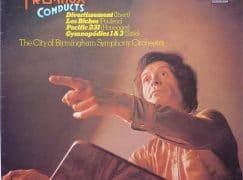Sad news: A grand French maestro has died
mainWe have been informed of the death of Louis Frémaux, an estimable conductor who was principal conductor of the City of Birmingham Symphony Orchestra from 1969 to 1978, and chief conductor of the Sydney Symphony Orchestra, 1979-1982.
Louis died at home on Monday. His death was reported the following day by a presenter on France Musique.
His decade in Birmingham, where he raised the orchestra’s profile with highly praised EMI recordings, ended unhappily with the departure of the general manager, Arthur Baker, and a players’ rebellion.
The double vacancy led to the appointment of Ed Smith as manager, aged 27, joined smartly by Simon Rattle, 25.
The rest is… well, you know.
We have fond memories of M. Frémaux.






Comments